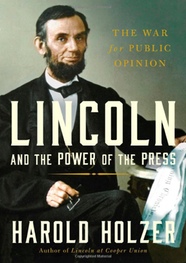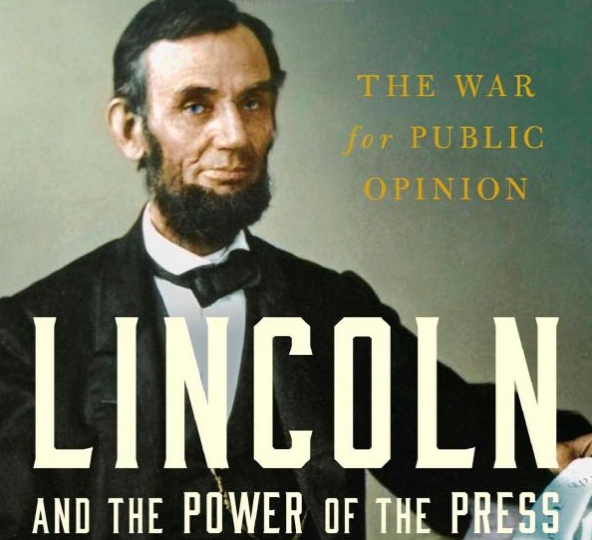This Is How Abraham Lincoln Played Politics. And It Won Him Re-Election.
A century and a half ago this month, Abraham Lincoln seemed safely headed to victory in his once-hopeless wartime quest for a second term in the White House. Public opinion polling had yet to be invented, but all available signs pointed by October 1864 to a Lincoln win. That is to say, the three most powerful newspapers of the day—the New York Times, New York Tribune, and New York Herald (their influence spread exponentially by their widely circulated national editions)—finally seemed united behind Lincoln, or at least resigned to his re-election. Their sudden, nearly unanimous enthusiasm must have seemed no less astounding to voters of the day than it would be now if a modern candidate won unanimous hosannas from CNN, Fox, and MSNBC alike.
How a campaign that Lincoln himself had once believed he would lose generated so much crucial support from influential editors at the eleventh hour is a story that turns a spotlight on the highly partisan press of the Civil War era. Newspapers not only covered news in the age of Lincoln, but openly took sides—or took part—in politics. The year 1864 saw the apogee of this interconnected, no-holds-barred, and sometimes disreputable culture, and one wonders whether even this year’s savviest candidates for the Senate could have navigated so perilous a press environment.
 The
1864 contest has accurately been called the most important
presidential election in history. Had Lincoln lost, his Democratic
successor, George B. McClellan, would have cancelled the Emancipation
Proclamation. Instead Lincoln rebounded. His comeback began not
only with General William T. Sherman’s morale-boosting September 1
capture of Atlanta, but because of the president’s relentless
ability to overcome the pessimism and outright hostility of
antagonistic or fretful press titans in the days before Sherman’s
triumph.
The
1864 contest has accurately been called the most important
presidential election in history. Had Lincoln lost, his Democratic
successor, George B. McClellan, would have cancelled the Emancipation
Proclamation. Instead Lincoln rebounded. His comeback began not
only with General William T. Sherman’s morale-boosting September 1
capture of Atlanta, but because of the president’s relentless
ability to overcome the pessimism and outright hostility of
antagonistic or fretful press titans in the days before Sherman’s
triumph.
When election season began, the “big three” New York editors exercised enormous influence. The Tribune’s pro-Republican Horace Greeley—who in late August morosely described the Union as a “bleeding, bankrupt, almost dying country longing for peace”—was an admired though eccentric antislavery champion. The Herald’s independent, conservative James Gordon Bennett was a recklessly sensationalistic but enormously popular chronicler of national life. And the Times’ Henry Raymond was a dependable Republican stalwart and moderate voice for Union and emancipation.
All three journalistic giants were much more than editors. All had long and openly immersed themselves in politics, too—not only influencing voters, but occasionally seeking votes as well. Neither the public nor the press perceived any conflict in their double lives. Without recusing himself from his editor’s chair, for example, Greeley had once served briefly in Congress (where he took little notice of his House colleague from Illinois, young Abraham Lincoln). The Tribune editor had lusted for elective office ever since, questing for lieutenant governor, governor, and the U. S. Senate—and losing every race.
Raymond, by contrast, had been Speaker of the New York State Assembly before founding the Times, and lieutenant governor after. While serving as an on-the-scene reporter, Raymond had dazzled the very first Republican National Convention with an acclaimed keynote speech—functioning as a sort of Mario Cuomo and Chris Cuomo rolled into one. During the 1864 presidential election year the inexhaustible editor became a candidate for Congress from Manhattan while concurrently managing the paper—and in the bargain chairing the Republican National Committee (no unique conflict there: the co-owner of the anti-war New York World chaired the Democratic Party). During his spare time, Raymond managed to author a flattering 492-page Lincoln campaign biography. In return for their (not always consistent) support of the Lincoln administration over the past three years, both Greeley and Raymond had expected—and routinely received—federal patronage jobs for their friends.
Bennett was a different sort, unaligned with organized politics since the Jacksonian era, and gleefully critical of most politicians since, including Lincoln, whom the racist editor had recently assailed for making soldiers of African Americans. Bennett proved so hostile to black freedom that his local newspaper rivals (with whom he had been battling for market preeminence for more than a decade) held him responsible for stirring enough resentment to military conscription to ignite the deadly 1863 New York draft riots. For years, Lincoln’s allies had advised him that all Bennett really wanted was social recognition: “to be invited with his wife and son to dinner or tea at the white house.” Even in 1864, Lincoln resisted making “respectable” a man many Americans regarded at best as a vulgarian and at worst a Southern sympathizer.
Ironically, when Lincoln let it be known he desired a second term, it was Republican Greeley who proved the most dubious and duplicitous of the big three. He not only backed the third party candidacy of failed Union General John C. Frémont, but concurrently encouraged Lincoln’s own, incurably ambitious Treasury Secretary, Salmon P. Chase, to challenge his boss for the Republican nomination. “If in 1864 I could make a President (not merely a candidate),” Greeley enticed him, “you would be my first choice.” When the Chase boom collapsed, the editor tried to lure Generals Sherman, Ulysses S. Grant, and even William Rosecrans into the race, but all three declined to challenge their commander-in-chief. Even with the president’s re-nomination a foregone conclusion, Greeley editorialized on the eve of the June convention: “Mr. Lincoln is already beaten. He cannot be elected. And we must have another ticket to save us from utter overthrow.”
Greeley was not yet done undermining the president. Two years earlier he had lobbied Lincoln to hasten emancipation, but now, astonishingly, he began negotiating his own armistice with the Confederacy, placing black freedom on the negotiating table. Amidst much publicity, the editor journeyed to Niagara Falls to engage self-appointed Rebel emissaries on peace. But at the last minute, Lincoln ingeniously saddled him with instructions that made clear that armistice would be considered only if it embraced both “restoration of the Union and abandonment of slavery.” That proved a non-starter for Rebels determined to leave Niagara Falls with recognition of both their independence and their human property. The talks collapsed—as the canny Lincoln sensed they would.
Sherman’s victory at Atlanta a few weeks later took much of the steam out of George McClellan’s Democratic challenge. Yet later that same month, the incorrigible Greeley sent letters to the nation’s Republican governors urging them to call a new party convention to dump the president and replace him with another candidate. Only when this last-gasp effort failed did the editor perform yet another acrobatic flip-flop. Once Frémont withdrew from the race on September 17, Greeley’s efforts to re-elect a president he had tried so hard to sabotage included an effort to ban Democratic newspapers from the camps of Union soldiers who would soon be casting absentee presidential ballots. For once unforgiving, Lincoln dismissed the editor as “an old shoe—good for nothing now, whatever he has been.” He never saw Greeley again.
Although the President’s tough stance had burst Greeley’s Niagara Falls peace bubble, Lincoln’s defense of emancipation ended any delusion that restoration of the Union remained his sole war goal. This renewed spotlight on black freedom had in turn alarmed the Times’s Henry Raymond. On August 22, the party chairman sent Lincoln a despairing letter predicting a “rising tide” against the Republicans and warning that the president could not possibly win a second term unless he initiated peace negotiations of his own and offered to postpone emancipation after all. Exasperated, Lincoln summoned the entire national committee to the White House, where he worked his magic on Raymond, convincing him it would be better to lose than renounce the Administration’s greatest accomplishment.
“Cheered” by the pep talk, Raymond went back to work in Lincoln’s behalf with a vengeance. When his reinvigorated efforts included demanding that Brooklyn Navy Yard workers donate to the Lincoln campaign or forfeit their jobs to people who would, an infuriated Navy Secretary Gideon Welles demanded that Lincoln overrule a scheme he ascribed to the “vicious school of New York politics.” Not surprisingly, the president sided with the New York “school,” campaign donations—and Henry Raymond.
Bennett proved the toughest to harness, and for a time, his editorial attacks the ugliest. Eventually, Lincoln secretly dispatched journalist William Bartlett to the Herald in an attempt to defang its explosive editor (though similar negotiations had failed four years earlier). The President’s wife, Mary, journeyed to New York to flatter Bennett—whom she genuinely liked—in person. Rebuffed, the administration countered with its only real “peace” proposal of the campaign: the offer of a plum diplomatic post for Bennett in return for his support, nothing short of a criminal act in today’s regulated political world.
Although some historians have maintained that the Herald thereafter formally backed Lincoln’s candidacy, this is not true. Indeed, the paper continued to criticize the president. Perhaps an outright endorsement would have seemed too obvious and craven, even for Bennett. Instead, the Herald simply intensified its criticism of Democrat McClellan. In one of his final comments on the election, Bennett groused: “We have no hope of Paradise regained with this election…. The choice, Old Abe or Little Mac, is rather a choice of evils than a choice of excellences.” But when a desperate Confederate president Jefferson Davis proposed offering southern slaves their freedom in return for military service in his depleted army, Bennett graciously admitted in print: “When such propositions come from Richmond, the negro soldier policy pursued by President Lincoln ceases to be a debatable question. He is vindicated by the Rebels themselves.”
On November 5, with editorial praise from the Tribune and Times reverberating nationwide, and the Herald’s universal sound and fury signifying little, the president won a landslide victory.
Lincoln lived up to his side of the secret bargain with the devil that had helped put him over the top. Although the guileless Gideon Welles had heard rumors of a post-election reward for the still-critical Bennett and confidently dismissed them, Lincoln indeed offered the controversial editor the prized post of Minister to France—perhaps consoling himself that banishing his old enemy overseas would at least permit reconstruction to begin without the Herald’santicipated scorn. But Bennett grandly declined, insisting he was too old to assume “the labors and responsibilities of so important a position.” Perhaps all he ever wanted was to be asked, as Lincoln perceptively understood.
Gideon Welles should have known better than to doubt that Lincoln would pay his debt to Bennett, just as he had granted extraordinary influence to Greeley and Raymond in order to maintain their loyalty and enthusiasm. After all, before entering politics, Welles had been an editor himself. And there had been no separation between journalism and politics during Welles’ time in the newspaper business, and for the next four roiling decades as well. Never was this more so than in 1864, the year New York’s big three editors nearly defeated, but in the end helped re-elect, Abraham Lincoln in the most important presidential race in American history.
